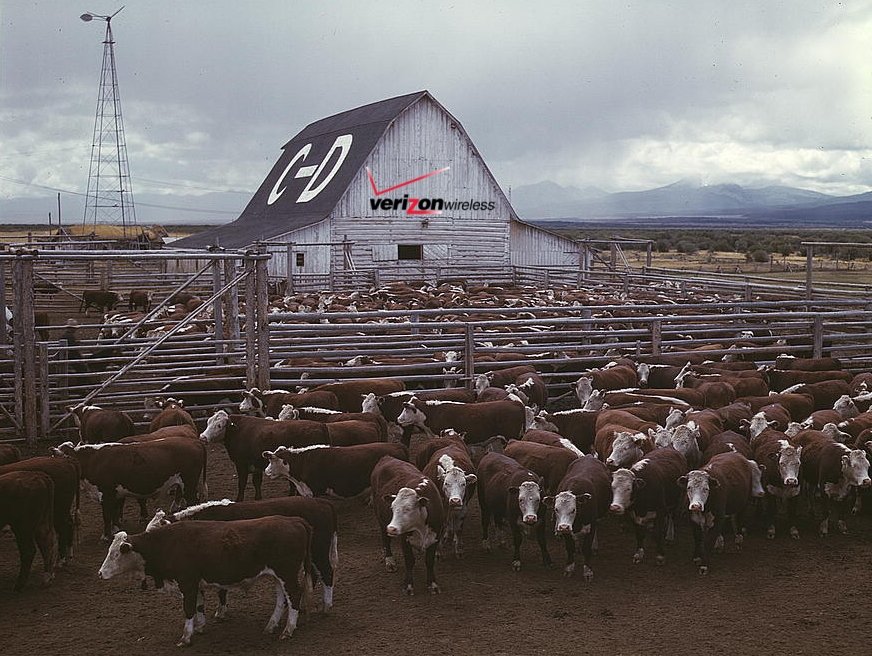
Herding rural customers off Verizon Wireless.
Nearly 20,000 rural Verizon Wireless customers in states like Maine, Michigan, North Dakota, and Montana are being notified their cell service is being terminated because they spend too much time roaming outside of a Verizon Wireless coverage area.
Verizon Wireless won’t say exactly how many customers it recently sent letters to advising them that because they have used “a significant amount of data while roaming off the Verizon Wireless network,” their service will be terminated Oct. 17.
“We’re providing advance notice to these customers so they have plenty of time to port their wireless number to another company before their Verizon Wireless service ends,” Verizon spokesperson Laura Meritt stated. “We regularly review accounts with data use that primarily takes place outside of the Verizon network.”
Verizon denies reports as many as 19,000 customers are losing service as a result of the purge, but their representatives are routinely quoting that number to customers and officials calling Verizon to complain.
Customers have no recourse and if they don’t port their number to another service provider by the termination date, their number will be disconnected and lost for good. The only good news? Verizon wants to disconnect customers so badly, they are willing to forgive the remaining owed balances for any devices financed through Verizon.
Maine
In Winter Harbor, many Verizon Wireless customers reportedly received the same letter, including the town’s police chief Danny Mitchell, who is concerned about the impact Verizon’s decision will have on local public safety.
“From a public safety standpoint, a lot of our 911 calls come in via mobile phone. And when you have less towers or less service to ping off from, then your area of location, instead of getting more specific in the location, is gonna get wider,” Mitchell told WLBZ-TV in Bangor.

Maine’s Public Advocate is concerned as well, and noted this is what happens when unfettered deregulation of telecommunications services give providers the right to terminate any customer for any reason.
“The Office of the Public Advocate is concerned about the well-being of all Maine residents,” the agency wrote. “This loss of wireless communication underscores the importance of our landline network to ensure that individuals can contact public safety officials in the event of an emergency. Verizon’s actions raise new concerns that areas once deemed a competitive marketplace for telecommunications will once again be served only by their landline provider. This possibility should be considered as the de-regulation of landline telephone continues throughout the state.”
Public Advocate Barry Hobbins thinks it all comes down to money.
“Because it’s not cost-effective for them, now they’re going to pull the plug — and basically pull the plug on 2,000 customers — then that becomes an issue,” he says.
 The decision to terminate an estimated 2,000 customers in rural Maine alone is especially stinging to residents, public safety officials, and community leaders because they bent over backwards to get Verizon Wireless to expand its coverage area in the state.
The decision to terminate an estimated 2,000 customers in rural Maine alone is especially stinging to residents, public safety officials, and community leaders because they bent over backwards to get Verizon Wireless to expand its coverage area in the state.
In 2015, communities in Washington and eastern Hancock counties joined forces to make life easier for Verizon in return for expansion of cell service in the region, quickly approving more than a dozen new cell towers adjacent to well-traveled Routes 1 and 9.
Mitchell said residents are more than a little annoyed that Verizon is kicking them off after all that they’ve done for the company.
In 2015, the Finance Authority of Maine (FAME) insured, at the public’s expense, a $3.4 million loan for Wireless Partners, LLC of Portland to enhance Verizon’s 4G LTE network with up to 32 new cell towers for those counties.
FAME Board Chair Raymond Nowak said at the time, “It is our hope that the planned communication improvements by Wireless Partners will support business expansion, emergency services, and the tourism industry in Maine. Such partnerships are a key part of FAME’s strategy to support infrastructure that enables the success of other businesses.”
“We are pleased to be partnering with FAME and Mechanics Savings Bank on this important project,” added Bob Parsloe, president and CEO of Wireless Partners, LLC. “This project will make it possible for people who live, work and recreate in Downeast Maine to have reliable 4G LTE broadband and voice cellular service that allows them to be connected like the rest of the world.”
Not anymore.
“[People are] going to come out their door every day, look at a cellphone tower and say, ‘Hey, I can’t connect to that because Verizon won’t let me,’” Mitchell said.
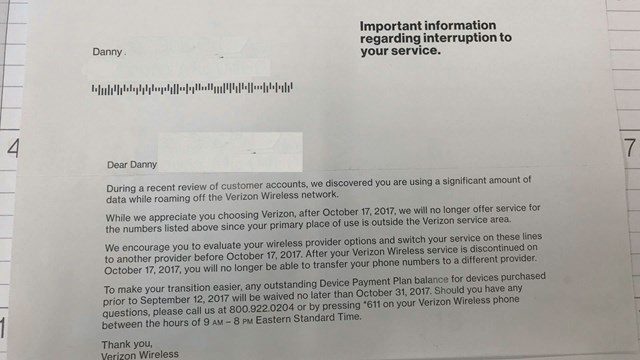
Letter from Verizon Wireless terminating service for “excessive roaming.”
In fact, Verizon Wireless customers who don’t live in the area, along with customers of other wireless companies who happen to be roaming while traveling, will be able to use those cell towers while former local Verizon Wireless customers cannot.
Law enforcement and public safety officials feel a little bait-and-switched by the decision.

Sheriff Curtis
Washington County Sheriff Barry Curtis says his department is still trying to wrap their heads around what Verizon Wireless is doing. But he seems confident it could adversely affect the department’s ability to stay in touch with law enforcement officials and respond quickly to calls. The decision could, in his view, set back the county several years.
“It’s kind of difficult sitting in this seat as far as being the sheriff here,” he says. “I’m in contact with the commissioners. I’m hoping that they’re going to be stepping up to the plate here, assisting us in this too — filing their complaints. We’re going to need all the help we can get here.”
With a chorus of complaints across rural Maine, officials at Wireless Partners have launched their own damage control effort to point the finger of blame at Verizon Wireless, and claim they had no idea the wireless company was pulling the plug on so many customers.
“Access to 4G LTE is an essential 21st century infrastructure need and it is the mission of Wireless Partners to meet that need in rural, underserved areas of Maine and New Hampshire,” said Wireless Partners CEO Bob Parsloe. “To that end, Wireless Partners built, owns, operates, and is expanding a Verizon Wireless 4G LTE network in Downeast Maine. Along with our network users, we were blindsided to learn that Verizon Wireless mailed subscription cancellation notices to their customers on this network. Wireless Partners was not given advance warning that Verizon Wireless was planning to restrict new customers nor terminate existing customers. We were only made aware of this development from concerned Verizon Wireless customers who were in receipt of the cancellation notification.”
Parsloe did hint at what is motivating Verizon to drop its own customers.
 “Verizon Wireless did ask Wireless Partners to assist them in reducing the contractually agreed costs of using our networks,” Parsloe added. “Wireless Partners promptly informed Verizon that it was ready to address their concerns. At no point during this dialogue, which continues in earnest, did Verizon Wireless indicate to us their intent to restrict new customers and cancel current customers.”
“Verizon Wireless did ask Wireless Partners to assist them in reducing the contractually agreed costs of using our networks,” Parsloe added. “Wireless Partners promptly informed Verizon that it was ready to address their concerns. At no point during this dialogue, which continues in earnest, did Verizon Wireless indicate to us their intent to restrict new customers and cancel current customers.”
Maine’s Public Advocate believes Verizon’s resumption of its unlimited data plan is probably costing the company more than it anticipated in roaming data charges levied by third party cooperating providers like Wireless Partners. In rural areas, private companies and independent providers often lease their networks to larger cellular companies like Verizon to enhance rural coverage and avoid exposing customers to punitive roaming charges. As far as customers are aware, they are using Verizon’s home network and there are no indications on their devices they are roaming.
Hobbins adds Verizon is doing this “all over the country” and residents in Maine — with large expanses of rural areas, are just among the first to react. But it annoys him that Verizon is implying in its letters that customers are doing something wrong. In fact, he says, they were simply using the service plan that Verizon sold them.
“It appears that Verizon induced these companies to build out in the rural areas around the country and then significantly promoted it by saying that they’re covering the rural areas when it fact now after putting those ads out, they’re now not covering the rural areas — in fact, they’re cutting it back,” Hobbins said.
Michigan
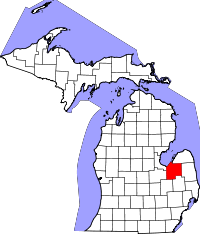
Tuscola County, Mich.
In mid-Michigan, customers are also getting termination letters from Verizon Wireless. In Tuscola County, Frank Rouse says he routinely spends $275 a month on four lines with Verizon Wireless and has been a customer for years. But Verizon is kicking him to the curb.
“I was pretty livid. I called customer service and I wasn’t real pleasant with them,” Rouse said, claiming he was furious when he opened the letter. “Why not do something proactive and maybe put up a tower in the area or something to keep the customers and draw in new customers.”
Mid-Michigan residents already have just a few choices for cell service, and now there is one fewer.
For Jamie Hay, it isn’t all bad news. He will lose his Verizon Wireless account but scored more than $3,600 in free phones and tablets he acquired for his family of six just two weeks before getting the letter.
“I made one payment and now I get to keep everything for free because Verizon is closing my account, voiding my payment plans and reporting all devices as now effectively paid in full,” Hay tells Stop the Cap! “Thanks to every other Verizon Wireless customer for covering my fabulous new phones and iPad!”
WNEM-TV in Michigan reports some customers are furious about being terminated by Verizon Wireless, and the company isn’t saying much. (1:32)
North Dakota

SRT Communications’ coverage map in North Dakota.
At least several hundred customers were notified across North Dakota that their Verizon Wireless service would also be terminated on Oct. 17. For many, once Verizon is no longer an option, cell service is no longer an option. Customers tell Stop the Cap! northern parts of the state are already reeling from North Dakota-based SRT Communications’ decision to exit the wireless business after 20 years. The company said it can no longer compete against larger companies like AT&T and Verizon and lack the resources to continue upgrades.
Customers are being encouraged to switch to Verizon Wireless, and Verizon has bought SRT’s spectrum and promised to improve coverage as part of the deal. But now some customers have been told they will not be able to keep their SRT service or Verizon Wireless much longer.
Montana
“Dropped like a bad habit,” as he put it, Kyle Wasson is among an unknown number of Verizon Wireless customers in Montana losing their Verizon service on Oct. 17.
Wasson, who was nearing a decade as a Verizon Wireless customer, is now no longer wanted, according to the letter he received: “We will no longer offer service for the numbers listed above since your primary place of use is outside the Verizon Wireless network” and “we discovered you are using a significant amount of data while roaming off the Verizon Wireless network.”
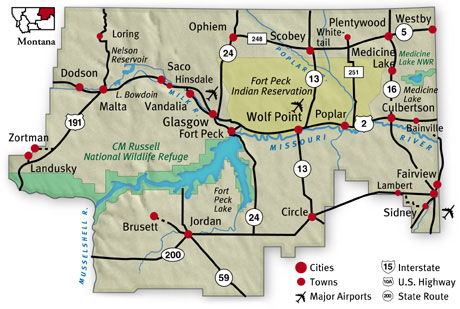
Northern Montana
Wasson had switched to Verizon’s unlimited data plan which he suspects might have had something to do with Verizon’s decision. Wasson doesn’t have many options in the town of Loring, 15 miles south of the Canadian border.
Neither does Brandi Horn in Harlem or Sue Hagen of Scobey — also told their Verizon service was being terminated next month.
“There is no better service in rural Montana than Verizon,” Horn said. “It’s going to be hard finding an affordable and high-coverage service now.”
LTE in Rural America (LRA) Program Implicated in Disconnections
Observers suspect the crackdown on rural roaming is primarily affecting customers served by the 21 partners Verizon has enrolled in its (LRA) program.
Under the program, LRA members lease Verizon’s 700MHz Upper C Block spectrum. Partners have access to Verizon’s network vendors and discounts and can sell the same equipment Verizon offers its customers in their stores. But the 21 companies are responsible for financing and building their own networks and can sell service independent of Verizon. In return, Verizon customers can “roam” on those networks as if they were still within Verizon’s home network. Verizon’s partners gain access to resources to build out their own LTE 4G networks and have a certain amount of effectively guaranteed traffic from Verizon customers in their service areas.
Verizon has leased out LTE spectrum covering 225,000 square miles in 169 rural counties in 15 different states. The company said more than 1,000 LTE cell sites have been built and switched on through the program, covering 2.7 million people.
But Verizon does not have the capacity to throttle or deprioritize traffic on third-party networks, meaning customers enrolled in an unlimited data plan can use as much data as they want on partner networks. There is a strong likelihood Verizon has to compensate those providers at premium rates for network traffic generated by their customers.
That means customers are at the highest risk of being disconnected if they are on an unlimited data plan and use their Verizon devices in areas served by these providers — all participants in the LRA program:
Bluegrass Cellular; Cross Telephone; Pioneer Cellular; Cellcom; Thumb Cellular; Strata Networks; S and R Communications; Carolina West; Custer Telephone Cooperative; KPU Telecommunications; Chariton Valley Communication Corporation; Appalachian Wireless; Northwest Missouri Cellular; Chat Mobility; Matanuska Telephone Association; Wireless Partners; Triangle Communications; Nemont; Mid-Rivers Communications and Copper Valley Telecom.
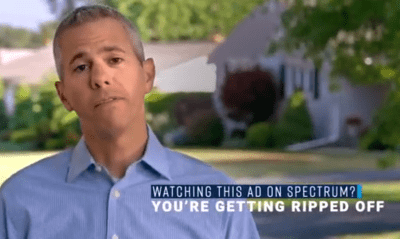
 Brindisi has bristled over the New York State Public Service Commission’s decision to repeatedly extend the deadline given to Charter to file an orderly exit plan winding down its cable operations in the state. The most recent extension was approved on Wednesday, now giving Charter Communications until April 5, 2019 to appeal the Commission’s decision and until May 9, 2019 to file its six-month exit plan.
Brindisi has bristled over the New York State Public Service Commission’s decision to repeatedly extend the deadline given to Charter to file an orderly exit plan winding down its cable operations in the state. The most recent extension was approved on Wednesday, now giving Charter Communications until April 5, 2019 to appeal the Commission’s decision and until May 9, 2019 to file its six-month exit plan.

 Subscribe
Subscribe New York’s top telecommunications regulator has called Charter Communications a purveyor of fake ads, deception, and broken promises and has again called into question how much longer the company should be allowed to do business in New York State.
New York’s top telecommunications regulator has called Charter Communications a purveyor of fake ads, deception, and broken promises and has again called into question how much longer the company should be allowed to do business in New York State.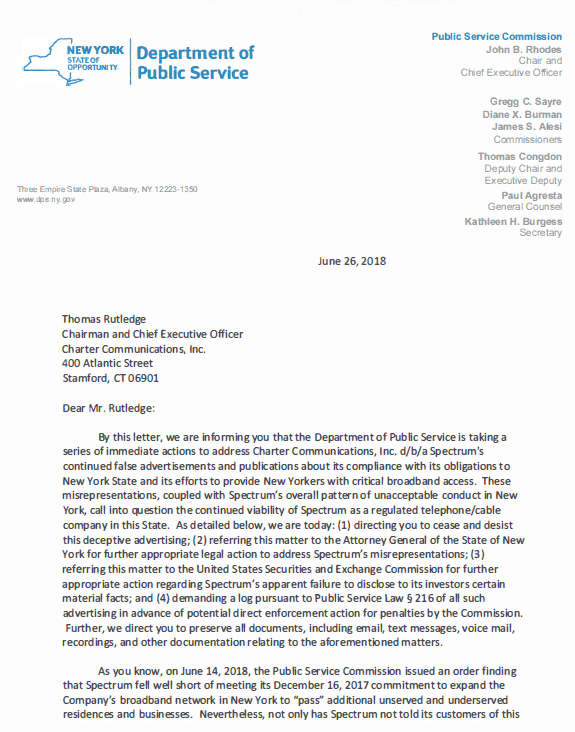

 According to a PSC investigation and a Public Service Commission order, Spectrum missed its required December 16, 2017 build-out commitment to extend its network to pass additional residences and businesses by 12,245 passings. Spectrum also failed to cure, as required, its earlier failure by March 16, 2018. For these two failures, Spectrum was ordered by the Public Service Commission to forfeit $2 million. These failures came on top of
According to a PSC investigation and a Public Service Commission order, Spectrum missed its required December 16, 2017 build-out commitment to extend its network to pass additional residences and businesses by 12,245 passings. Spectrum also failed to cure, as required, its earlier failure by March 16, 2018. For these two failures, Spectrum was ordered by the Public Service Commission to forfeit $2 million. These failures came on top of 
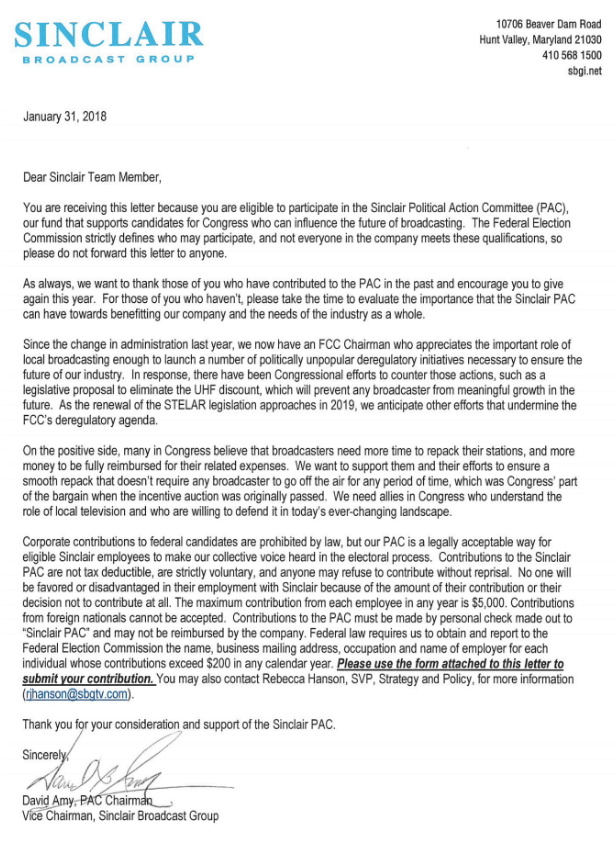
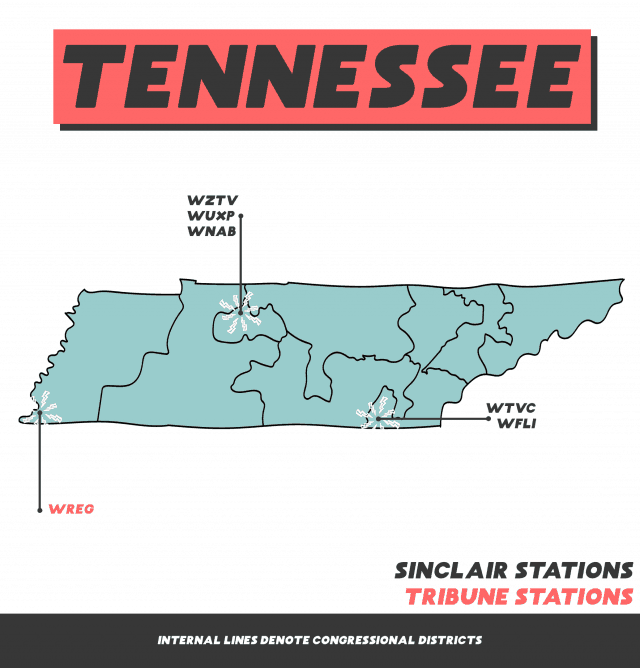
 WTVC (NewsChannel 9) and WFLI (The CW) in Chattanooga
WTVC (NewsChannel 9) and WFLI (The CW) in Chattanooga AT&T successfully bribed a Oklahoma telecom regulator to allow the phone company to keep at least $30 million annually in excess revenue. Despite the fact two key players in the bribery scandal were eventually sent to federal prison, Oklahoma’s state government has done all it can to protect AT&T. At issue is up to $16 billion in refunds and damages payable by AT&T — approximately $15,000 per customer, that the state claims would not be in the public interest. Now a consumer group —
AT&T successfully bribed a Oklahoma telecom regulator to allow the phone company to keep at least $30 million annually in excess revenue. Despite the fact two key players in the bribery scandal were eventually sent to federal prison, Oklahoma’s state government has done all it can to protect AT&T. At issue is up to $16 billion in refunds and damages payable by AT&T — approximately $15,000 per customer, that the state claims would not be in the public interest. Now a consumer group —  In 1988, when he was running for a seat on the Corporation Commission, Anthony said
In 1988, when he was running for a seat on the Corporation Commission, Anthony said 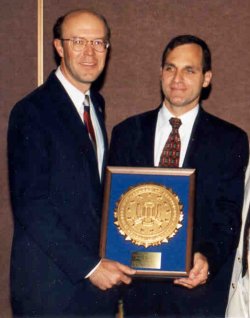
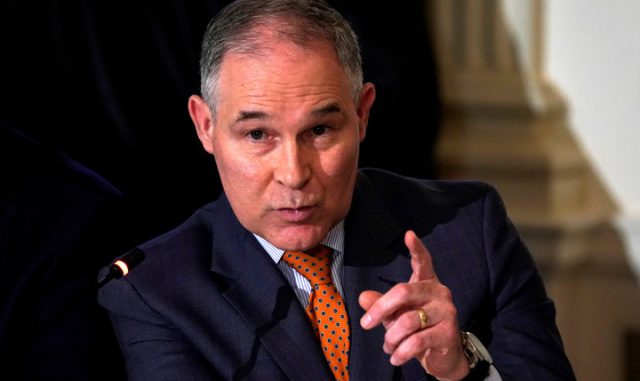
 Oklahomans Against Bribery continues to believe the law is on their side, despite arguments from AT&T’s attorneys that even bribery-tainted votes count.
Oklahomans Against Bribery continues to believe the law is on their side, despite arguments from AT&T’s attorneys that even bribery-tainted votes count.








